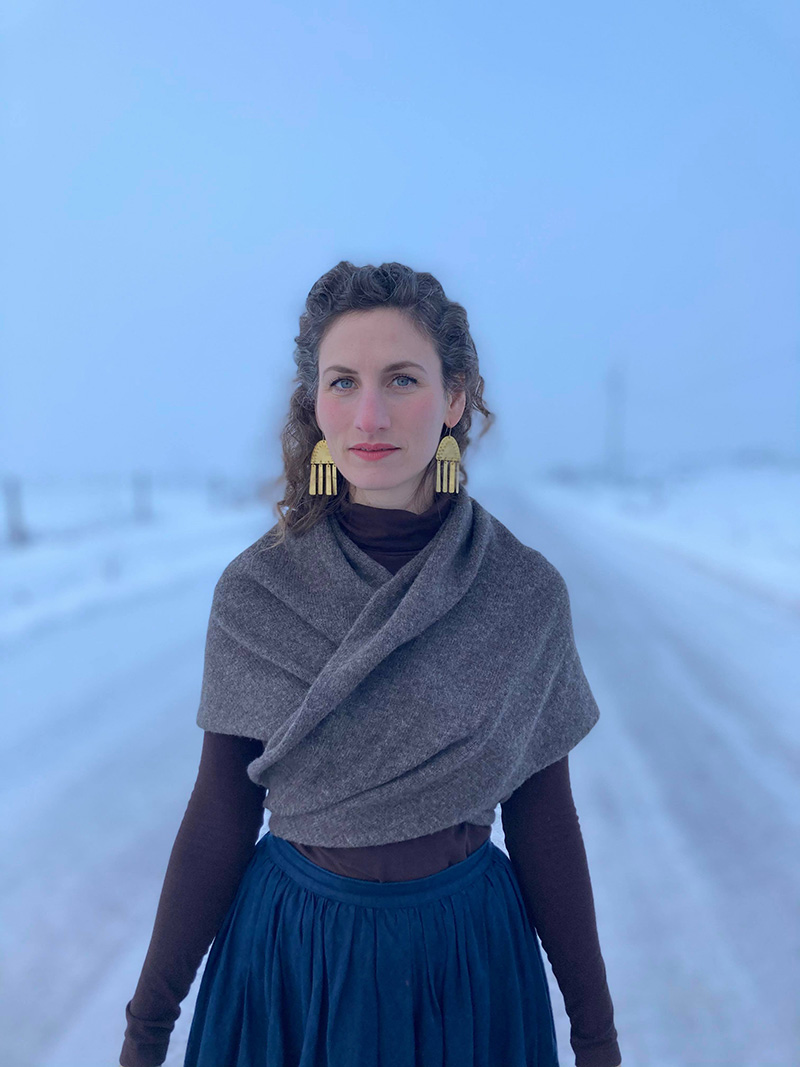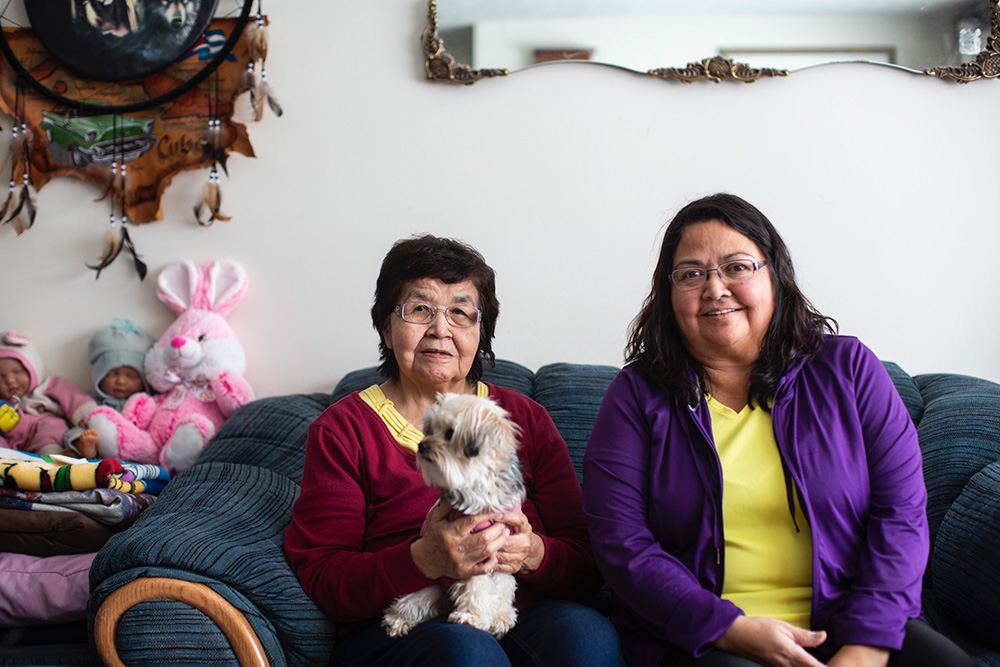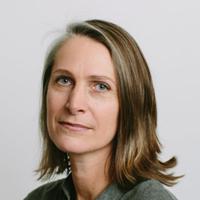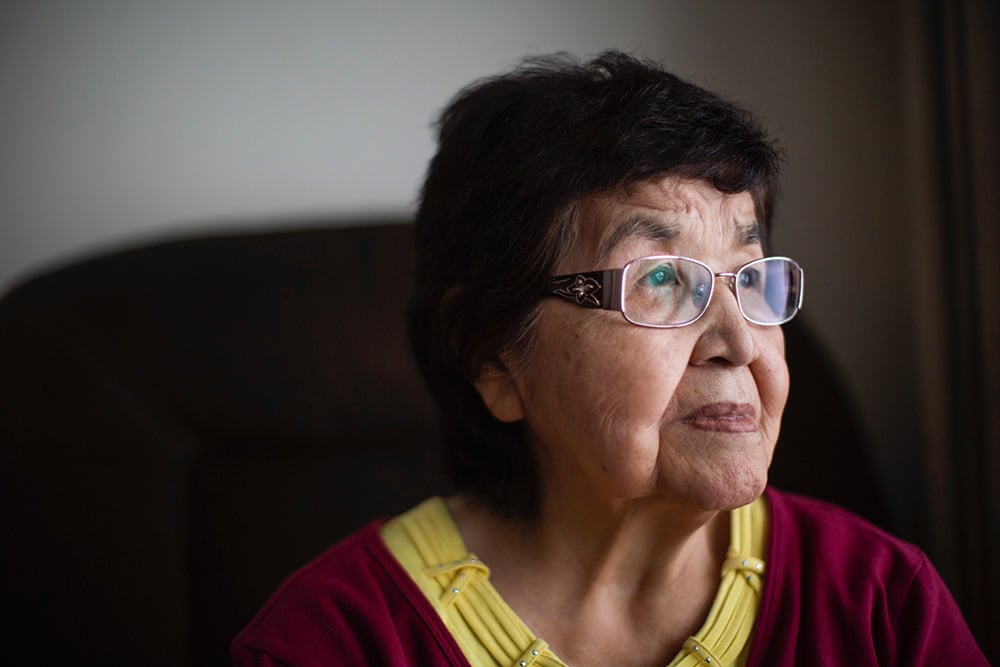[Editor’s note: The Tyee’s reporter Amanda Follett Hosgood, who is based in Smithers, wrote this last year as people struggled with the isolation, stress and rootedness that pandemic health measures imposed. A year later, her piece seems even more apt and so we republish it here.]
A lot changed with the advent of electric light.
“Before that, in the winter, we were plunged into darkness for most of the day and we were forced to entertain ourselves in non-visual ways,” says Danica Boyce, a spiritual coach, paganism educator and producer of Fair Folk, a podcast about European folklore.
“Someone would tell stories. Your grandfather would be the television, or your grandmother, and they would entertain you, as long as you were awake.”
Over the past century, flickering televisions have replaced the flickering hearth. Social media replaced storytellers as a source of news and information. Our hands have become occupied by cellphones instead of clicking knitting needles or the knotting of fishnets — or just sitting, quietly, in the dark.
In a year of cultural upheaval, Boyce believes those latent rituals can be reignited. “Reconnecting with seasonal tradition, I think, is one of the most beautiful ways you can do that,” she says.
This holiday season, many are struggling with giving up their usual traditions. Travel has been grounded. Cold weather puts a chill on outdoor socializing. Even in a normal year, these dark days can be challenging, particularly in northern climates.
And this year has been anything but normal.
The Canadian Mental Health Association and researchers at the University of British Columbia confirm that, for many, the pandemic has intensified stress, anxiety and depression. Data released earlier this month indicates that 40 per cent of Canadians feel their mental health has deteriorated since March, a number that rises to more than 60 per cent for those with pre-existing mental health conditions.
Additionally, our ability to gather — the social balm that gets us through these long nights and chilly days — is severely limited. On Dec. 8, B.C.’s provincial health officer extended health orders restricting gatherings to immediate households through the holiday season. Festivities will move online, advised Dr. Bonnie Henry, with traditional in-person gatherings prohibited.
Our social fabric can feel like the rug that’s been pulled out from under us. But that doesn’t mean we can’t weave new traditions.

“Tradition is not this set-in-stone thing. It’s adaptive, and that’s something we’ve forgotten along the way,” Boyce says. “People have always developed traditions based around their needs in their environment. So, when we’re in a new environment, it’s OK to develop new traditions.”
To survive the coming months, Boyce says, we can dig deep and reconnect with past traditions.
Some still remember them.
Sue Alfred, Wila’at, grew up near Witset in a log home without electricity or running water. The Wet’suwet’en Elder remembers a time when northern B.C.’s climate was different, with temperatures plummeting well below freezing for months at a time and snow piling up to eight feet high.
Without a vehicle, she and her five siblings would walk the two miles to school, where they did their studies on benches around the wood stove. They would spend half the day — with only one teacher for 50 students, the class was split in two — before walking home again.
There, they spent the rest of the day doing homework and chores. In the darkest months, they spent evenings inside.
“We weren’t allowed to play out at night when it’s really cold,” says Alfred, now in her 80s. Instead, in the home lit by gas lanterns and warmed by coal and cook stoves, they gathered around her grandmother. “I called her ‘Encyclopedia’ in those years. She told us a lot of stories.”
It’s where Alfred learned her family history: How they had lived on their land, Tsayu territory, near Houston until they were ordered to leave by RCMP officers and the Indian Agent. Her grandmother would cry as she shared how they attempted to rebuild closer to Witset, only to be removed a second time.
When her mother was still a baby, the family settled where they are now, west of Witset. She still lives there, surrounded by a cluster of homes that house her extended family.
In many ways, the bubble of her youth has become her pandemic bubble.
“It’s similar to how it was years ago, yes,” she says.
Of course, some things are very different. The ability to light our homes artificially — to say nothing of the technology that allows us to work remotely — brought about new expectations for productivity.
Before the lightbulb, there wasn’t a lot that could be done during those dark winter months. Instead, it was the rest season, Boyce says, the entire winter months one long holiday that started late October.
Darkness was also viewed differently in traditional European culture, she says. It was a beginning, a gestation period, and seen as an opportunity to look to the future. Nightfall marked the start of the next day. Winter was the start of a new year. Even holiday celebrations began the night before — think All Hallows’ Eve and Christmas Eve.
They all began in darkness.
“It’s this really cool reminder that all life starts in darkness,” Boyce says. “You’re in that seed moment of the year — you have to rest because there’s no other option. We’re being brought back into that experience now with COVID, where we’re going to have one of our first real winters in the Western world since the invention of television and the lightbulb.”
Our ability to control light-dark cycles has also wreaked havoc with our biological clocks, says Dr. Raymond Lam, director of UBC’s Mood Disorders Centre and associate head of research in the university’s department of psychiatry. That disruption, which is akin to jetlag, leads to what is commonly known as “winter blahs,” something he says afflicts at least 15 per cent of the population.
“We do expect that will be worse this year, because of all the pandemic stress as well as the pandemic restrictions,” Lam says.
(It’s important to distinguish between the blahs and seasonal affective disorder, or SAD, a subtype of clinical depression. If depressive symptoms persist most days for several weeks and interfere with daily functions, Lam suggests a visit to your family physician or a clinic.)
Tackling that feeling of mild depression and lethargy means getting on top of it early by setting a schedule and prioritizing exercise — things that have become harder with pandemic restrictions and working from home.
Lam suggests going to bed early, setting an alarm and planning a morning walk. It’s important to get outside.
Even on the dreariest days, natural light is five to 10 times brighter than indoor light, he says, and key to surviving winter months. Morning light is most effective — the reason why light therapy is given first thing — but getting out any time of day will improve your mood.
Conversely, being exposed to bright light at the wrong times will also mess with those biological rhythms: “Which is why we tend to tell people to avoid screen time late at night,” Lam says.
Evenings should be a winding down time, with low light and little stimulation. Settle in, light a candle and write those Christmas cards you’ve been avoiding. Any way we can connect with loved ones this season will improve our moods.
“Keep up those social interactions however you can, whether that’s virtually or writing letters,” Lam says. “Any way that you keep in touch with people is very important.”
In the Middle Ages, Boyce says winter was believed to be a time when the spirit world was more active. People would stay home to stay safe. Sometimes they would don the images of those ghouls and monsters and visit neighbours, Halloween being the most obvious example.
“All over Europe, there’s different versions of this,” Boyce says. Living in small dwellings, often sod huts, made gathering indoors with other families difficult. Instead, people would have gathered around a bonfire or visited door-to-door.
Carolling is another example.
“That’s something that we can really embrace this year — the idea of visiting someone’s house and delivering a song without having to actually be within close radius of another person,” she says. “I feel like if carollers came to my house this year, I would just cry.”

In many ways, our pandemic bubble has become the village of the past. Limited connections present an opportunity to deepen relationships with tightened support circles.
Alfred’s family can no longer gather for meals and holidays, but they still connect through food.
“I make fresh bread for all the family members in the neighbourhood,” she says. “Just to pass time, sometimes I cook up a big storm [at] suppertime and everybody gets food. I have a whole pile of takeout trays and everybody gets food.”
Last year, her daughter Dolly moved home with her. Both women are fluent Wet’suwet’en speakers (Dolly has won awards for her Witsuwit’en Wednesdays, which share a new word each week). And both have been teaching their grandchildren and great-grandchildren the language. The youngest, at just one year, is already beginning to speak it, Alfred says.
Alfred is president of the Witsuwit’en Language and Culture Society and sits on other boards and committees. Those activities have all moved online. With children, grandchildren and great-grandchildren spread throughout the province and even into the U.S., her family — like so many others — is also staying connected over the internet.
“I do a lot of Zoom meetings,” she says, adding: “I’ve been very busy.”
Boyce’s life has also largely moved online. This winter she’ll join knitting Zoom calls, work on her podcast and both take and teach online courses.
She’s taking inspiration from the darkness.
“Darkness is the beginning of the world, not the end of it. Just like humans in the womb — they start in darkness for many months before they emerge into the light, and that’s just as an important part of their development as any other,” she says.
“It’s just a matter of taking the opportunities where we have them. Deciding to think positively about things instead of deciding the world is ending.”
Happy holidays, readers. Our comment threads will be closed until Jan. 3 to give our moderators a break. See you in 2022! ![]()
Read more: Health















